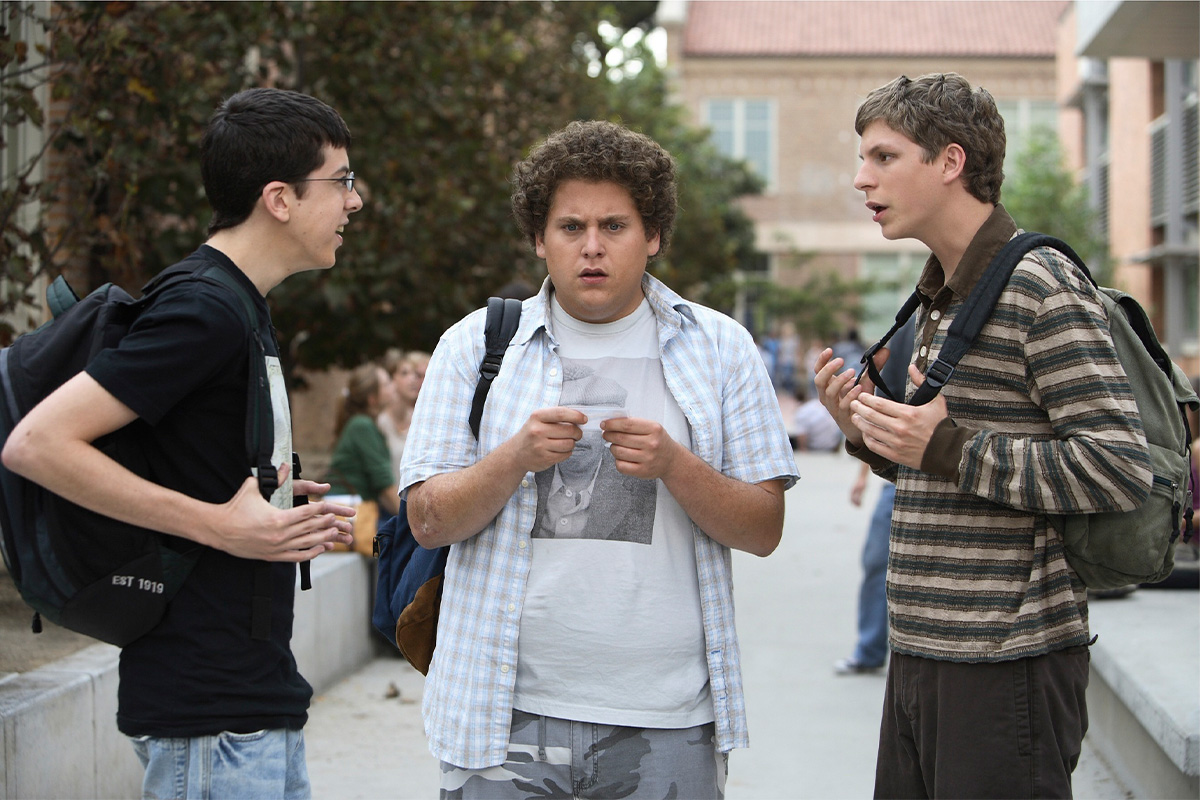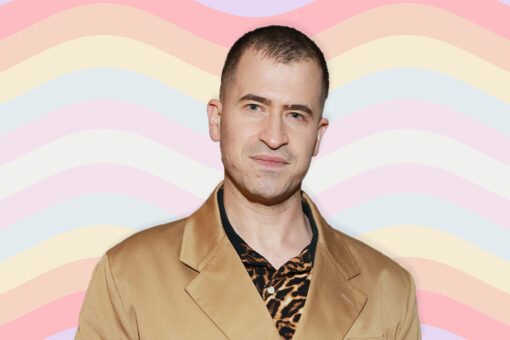I really shouldn’t love Superbad as much as I do. If you haven’t taken the time to watch this masterpiece, it’s a millennial teenage comedy written by Seth Rogen and Evan Goldberg about their own high school experiences. Jonah Hill and Michael Cera play their dramatized counterparts, and we follow them on a quest to have sex and (illegally) buy beer.
I’m not exactly the target audience: I would have been 10 when the movie came out 15 years ago. I also live in the UK where the drinking age is only 18 (and even before then, you’re only ever one dodgy off licence or liquor store away from a bottle of cheap knock-off vodka). So the premise of the film could be a bit lost on us boozy Brits.
I’m also a girl, and this movie is more concerned with a male perspective and with what it means to grow up and become a man.
But I’m also a Jew, and my love for “Superbad” made sense to me in a new way when I learned that Seth Rogen and Evan Goldberg started writing it in bar mitzvah classes. No wonder “Superbad” is the ultimate coming of age film: The ill-fitting shirts, futile attempts at sophistication, and love and warmth you would expect at any good bar mitzvah can be found in the movie, too. I had the same haircut as Seth for the entirety of my school career, but that’s not the only reason I related to him as a teen. I was also awkward, I talked too much and far too loudly, and I loved my best friends so much it physically hurt. That platonic love is really highlighted here, and not just for laughs; as Evan says, “it’s the most beautiful thing in the world.”
That’s not to say it makes for comfortable viewing in 2022. Seth Rogen himself has gone on record to say that the homophobic language dotted throughout the script is unacceptable today. There is a striking lack of diversity, and the comedy centered around two incapable cops just doesn’t work anymore: I feel more anger than hilarity watching the incompetence of Bill Hader and Seth Rogen’s police officers. That’s before even mentioning the film’s depictions of women. Like in so many 2000s R-rated teen comedies, women are the butt of Evan and Seth’s jokes rather than the jokers themselves. It would actually take Jonah Hill’s sister, Beanie Feldstein, to change all that 10 years later.
But you can’t deny that the warmth is there. And in 2007, after the era of “American Pie” and raunchy sex comedies, “Superbad” was practically progressive. By the end of the movie, the audience realizes that friends’ rude banter is just that: banter. When things get serious, like when Becca (Martha MacIssac) is too drunk to consent, Evan knows not to take advantage. I mean, I realize this is actually a disgustingly low bar — but in the mid-aughts, the bar was really that low. Ultimately, in the context of their time, they were mensches.
The Jewish vibe is also probably why I relate. The film isn’t really explicitly Jewish — I counted precisely one mention of Judaism in a slightly misjudged joke about race and whiteness. But it doesn’t need to be, because it just is. The Jewishness is innate because the story is written, produced and acted by Jews. Well, mostly — “Superbad” has such an authentically Jewish character that I have to believe that Michael Cera’s Jewish certification got lost in the mail.
If you want to get nerdy about the Jewish subtext of it all (and who doesn’t?), you could read the story as an allegory for the Jewish diaspora experience. Seth and Evan (named after the real writers) are somewhat losers at school, with only each other’s friendship to help them through. The way they can finally be accepted into American society is to attain a non-Jewish, conventionally attractive girlfriend. The other way to achieve a Western standard of success is to get into an Ivy League school, something Seth doesn’t manage to do; he therefore fixates on the success of the party to achieve ultimate happiness. The method they choose to fulfill their goal? Provide the means to get everyone absolutely wasted. Pass me the Manischewitz.
Urban Dictionary, practically a Talmudic authority, even defines Jew Crew as “a group of actors who work with producer Judd Apatow to make raunchy comedies” — not just “Superbad,” but “The 40-Year-Old Virgin,” “Forgetting Sarah Marshall” and “Knocked Up.” These movies are all mainstream successes with Jewish faces behind them. I’ll admit, that’s pretty cool.
Apatow has described the group as the “Spice Girls of Jews,” but that description stings a bit: When “Superbad” was made, this crew didn’t count a single girl among its members . In fact, the group consists of white-passing, cis-het men: not only Hill and Rogen, but also Jason Segel and Paul Rudd. They basically depict one kind of Jewish experience — an Ashkernormative, secular-ish, male one. For the 15-year anniversary, the whole “Superbad” team did an interview with Vanity Fair. Talking about the infamous period blood scene, director Greg Motolla reminisces about the discussion over whether it was sexist. Motolla jokes that “Seth and Evan reassured me that we’re fine.” It seems obvious that Motolla should have been “reassured” (or not) by an actual woman.
Watching “Superbad” feels like I’m so nearly in the club. I’ve bought the ticket, I’ve got the wristband, but, just like McLovin, my ID is not quite enough to establish me in *their* Jew crew. Oh well, I’ll have to start my own. And Seth and Evan — both the characters and the real-life writers — have sort of shown me how.



